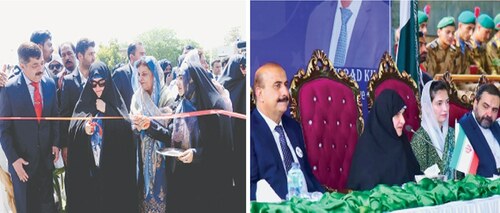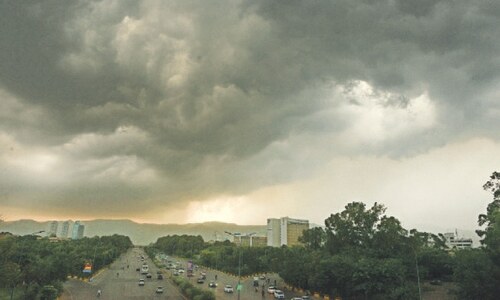Even 13 years after the then military ruler, General Pervez Musharraf, performed the groundbreaking of a housing project for the rehabilitation of the survivors of the 7.6 earthquake from Balakot’s Red Zone, his words that he’d promised the ‘people of this area to convert this challenge into an opportunity and today, I have fulfilled my promise’ still echo in their ears.
Living in two-room prefab houses, the calamity-hit families totalling around 5,000 complain of the prolonged agony.
According to them, the New Balakot City housing project continues to be in doldrums with both federal and provincial governments blaming each other for the delay.
“We have been living a miserable life in small prefabricated shelters since Saudis donated them almost 15 years ago,” said Sidra Bibi of Balakot.
She said the quake survivors, mostly women and children, suffered from physical and mental trauma.
The Balakot town ruined by a 7.6 earthquake on Oct 8, 2005, was declared an unsafe and highly dangerous place for human living by an international team of seismologists and geologists.
The experts, who belonged to France, China and Japan, warned in a comprehensive study that the five-active seismic fault lines lied beneath the Balakot Red Zone consisting of Balakot and Garlat union councils and they could cause more destruction than the 2005 earthquake, which claimed over 80,000 lives in Khyber Pakhtunkhwa and Azad and Jammu Kashmir.
In this light, the government planned the construction of houses for around 5,000 quake survivors from the red zone in Bakrial area. The district administration acquired over 14,000 kanals of land before General Musharraf performed the groundbreaking of the housing project.
The military ruler claimed that France, Libya and the United Kingdom had provided a total of $75 million cash, around 25 million each, for the construction of modern houses, while the rest of the amount would be provided by the federal government.
Though he promised the rehabilitation of calamity survivors in three years, the latter continue to live in makeshift shelters.
Earthquake survivor Sidra Bibi said the administration banned solid constructions in the Red Zone shortly after earthquake but as the residents didn’t any choice, they violated the ban by putting up brick and concrete blocks.
She feared that such structures could bring about a major human tragedy like the 2005 destruction.
President of the New Balakot City Completion Movement Tahir Khan regretted that the earthquake survivors had yet to be allotted plots in the proposed New Balakot City.
“In 2018, some local politicians had given away the New Balakot City allotment letters to hardly 100 people that were later declared counterfeit,” said Mr Khan.
Work of the housing project was suspended in 2009.
President of Bakrial Landowners’ Action Committee Raja Zahoor Abbasi said the landowners were ready to withdraw the court cases if the government returned 700 kanals of agricultural land acquired by the district administration for the New Balakot City project.
He said a man was killed and a dozen were injured when the police opened fire on protesters in 2009 leading to the suspension of work on the housing project.
“We have cleared almost 95 per cent of our land acquired for the project and want to get back only five per cent of the agricultural land. If the government settles the issue, we will extend all-out support to the early completion of the housing project,” he said.
As local social activist Sheeraz Mehmood Qureshi moved the Supreme Court in Nov 2017, the then chief justice, Mian Saqib Nisar, took a suo motu notice of the prolonged delay in the completion of that mega housing project.
Justice Saqib Nisar visited the proposed New Balakot City’s site and Balakot and met earthquake survivors to learn about their issues.
The Supreme Court had ordered both federal and provincial governments last year to ensure the project’s completion in 30 months.
“Eight months have passed since the apex court issued orders but things on the ground are still unchanged,” Mr Qureshi told Dawn.
He said the former Supreme Court chief justice had formed a committee consisting of the federal finance and economic affairs secretaries, Khyber Pakhtunkhwa chief secretary, president of the Mansehra district bar association and him to oversee progress on the housing project whose cost had increased manifold.
“The court had ordered the federal government to release Rs1 billion immediately for the resumption of development work but the federal government hasn’t release a single penny yet,” he said.
The social activist said the international community had donated over $5 billion for the rehabilitation of earthquake survivors and infrastructure in Khyber Pakhtunkhwa and Azad Jammu and Kashmir but the money was misappropriated and transferred to other projects by the successive governments in other parts of the country.
“I ask the government where it has spent the huge money donated by international community as there’s no progress on the New Balakot City and health and education rehabilitation plans,” he said.
The current PTI government, which claims to be facing financial crunch since its establishment last year, hasn’t provided funds for the proposed New Balakot City. It is now changing the initiative into an international public-private tourism venture.
“Prime Minister Imran Khan has formally approved a public-private venture for the development of the New Balakot City as a tourist hub,” said Idrees Masood, a spokesman for the National Disaster Management Authority whom the Earthquake Rehabilitation and Reconstruction Authority was merged with.
The spokesman said contracts would be awarded soon after the completion of the tendering and bidding exercises.
“The New Balakot City will be a modern place, where earthquake survivors will get residential plots and an appropriate area will be developed for tourist activities,” he said.
Mr Masood said the NDMA had been following a strategy under which nothing or the minimum possible should be drawn from the exchequer for the development of this mega tourist hub for optimal benefits through a public-private partnership,” he said. He said the project site had huge tourism potential, so its development would contribute significantly to the kitty.
Rashid Ali Rashid Awan, a member of an earthquake survivors’ delegation, whom the Erra chairman recently informed about the development of the New Balakot City through a public-private partnership, said developing the proposed city as a tourist hub was a great idea.
“If hotels and other recreational facilities of international standard are developed as we’re told by the Erra chairman to attract tourists from within the country and abroad, it will be a great step towards the welfare of quake survivors,” he said.
Published in Dawn, February 23rd, 2020














































Dear visitor, the comments section is undergoing an overhaul and will return soon.